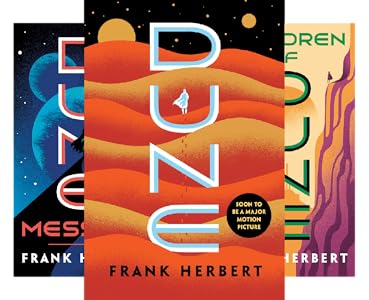
![]() The Machine Crusade by Brian Herbert and Kevin J. Anderson
The Machine Crusade by Brian Herbert and Kevin J. Anderson
As everyone knows by now, this isn’t Dune. The first LEGENDS OF DUNE prequel, The Butlerian Jihad, wasn’t, nor will The Machine Crusade be. The problem isn’t that The Machine Crusade doesn’t match up well against Dune, it’s that it doesn’t match up well against its predecessor, The Butlerian Jihad, which itself was mostly solid rather than excellent. The Machine Crusade is a bit of a step backward for this series.
As in The Butlerian Jihad, characterization continues to be pretty shallow, with several characters once again making transitions of behavior that really haven’t been earned by the story. And some characters are simply skimped on.
The prequel problem of predictability due to simply filling in the design you’re aiming at is more on display here than in book one, and while I can understand the need at some point for that last line (no spoilers here), making it the last line emphasizes the danger in writing prequels — the sense your reader has that the story is being uncovered rather than growing.
 The plot remains the strong point, but here too it is weaker than the first book. Some of it is too contrived, while some of it takes turns more for the plot’s sake than for any natural development. And the structure, which continues to cut back and forth between multiple characters and plotlines, in this book does a disservice to several characters and storylines while in the first book it served to create tension and suspense. We leave one story and when we come back to it too much has happened in the meantime that would be better shown than told or assumed. And I have to confess that some of the plot just didn’t seem necessary. Some sections reinforced ideas that were pretty clear already. Some were repetitive, both from this book and the previous one. And some simply dwelled on characters because it seemed the authors felt it was time to get back there for a while. I thought this book needed much more editing than The Butlerian Jihad, not necessarily to cut the length but to redistribute it. There was a lot that could have been freely excised, which in turn could have freed up space to do some better characterization or more sophisticated plot development.
The plot remains the strong point, but here too it is weaker than the first book. Some of it is too contrived, while some of it takes turns more for the plot’s sake than for any natural development. And the structure, which continues to cut back and forth between multiple characters and plotlines, in this book does a disservice to several characters and storylines while in the first book it served to create tension and suspense. We leave one story and when we come back to it too much has happened in the meantime that would be better shown than told or assumed. And I have to confess that some of the plot just didn’t seem necessary. Some sections reinforced ideas that were pretty clear already. Some were repetitive, both from this book and the previous one. And some simply dwelled on characters because it seemed the authors felt it was time to get back there for a while. I thought this book needed much more editing than The Butlerian Jihad, not necessarily to cut the length but to redistribute it. There was a lot that could have been freely excised, which in turn could have freed up space to do some better characterization or more sophisticated plot development.
Because of the weak characterization and the overweight plot, many of the set “emotional” scenes are anti-climactic and fall pretty lightly on the heart. Rather than bring a tear (ok, they probably weren’t aiming at tears but at least some sadness) they mostly elicit a shrug of the shoulders or a “yeah, that had to happen” sort of feeling, as opposed to any sense of loss.
Overall, The Machine Crusade suffers from a common middle book syndrome — it serves its purpose as a bridge to book three and that’s about it. There is little spark here, just a lot of concrete. You’ll have to read it to get to The Battle of Corrin, but don’t feel bad if you decide to skim a bit here and there.



“A lot of concrete” — that’s such a great image. Gives me an idea of exactly what the book is like. Just a highway that gets you to the next one!
I haven’t been able to get into any of the Dune sequels/prequel, mainly because of the Herbert/Anderson writing style, which seems to pander to readers with a short attention span. I find the short chapters and even shorter scenes jarring, abruptly tossing me around through the story, so much so that I can never make that connection and settle in for a read.
I find that the Herbert/Anderson prequels are interesting, but violent and bloody. Frank Herbert discussed/wrote/depicted dark and serious matters but he had that steel fist in a velvet glove.
I always felt beaten over the head after reading this series. I stopped reading. Though I loved the explanations of the mythology surrounding Dune, I couldn’t get past the feeling that the books set out to shock and appall.
“Concrete” is a good way to describe it.
Good to know. I’ve been debating reading this series for a while, but I don’t know. I might just give it a go so I can make jokes about it like everyone else.